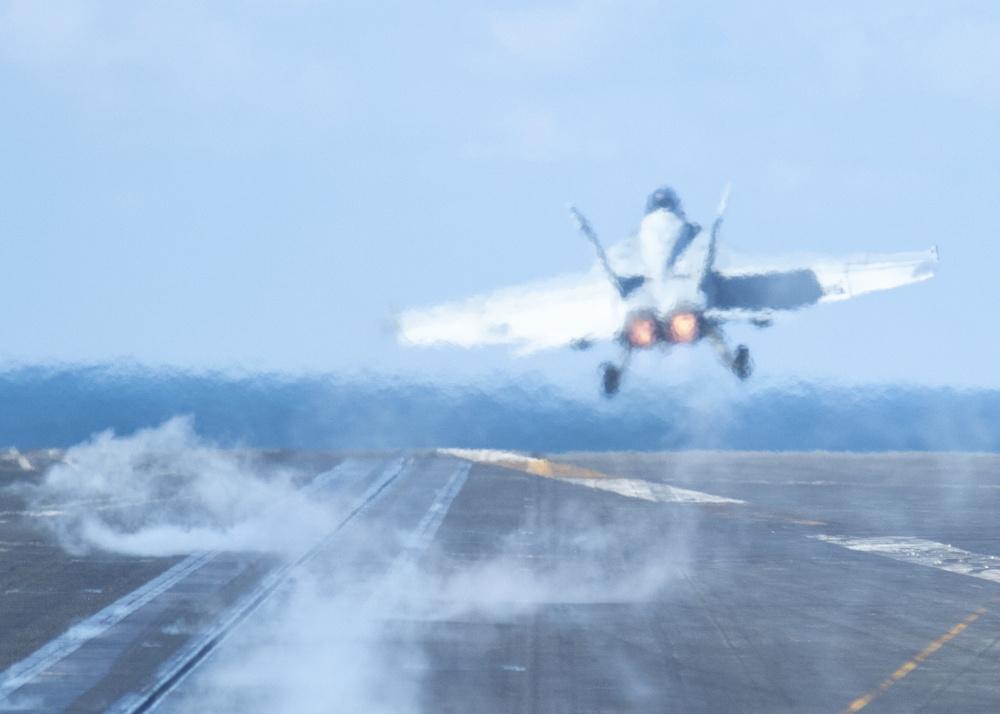
Sea state
A new law passed by China allows its coastguard to fire at foreign vessels within its waters, potentially setting the stage for armed clashes between China and nations that have competing claims in the South China Sea. Vietnam has condemned the new law, while the Philippines has labelled it a ‘verbal threat of war’. The day after the law passed, the US sent an aircraft carrier group into the South China Sea. The Pentagon later confirmed that America’s mutual defence treaty with the Philippines would apply to any attacks by the Chinese coastguard.
On 31 January, US Navy destroyers in the Black Sea were buzzed by a low-flying Russian Su-24 jet, which flew low alongside USS Donald Cook, within about 100 metres of the vessel. US Navy Commodore Kyle Raines criticised the move, saying the jet’s ‘unnecessary proximity’ was ‘inconsistent with good airmanship’. The US says its ships were deployed to ‘reassure NATO allies’ and ensure a ‘safe, secure and prosperous European region’. NATO said the deployment was also to oppose Russia’s military build-up and aggressive actions in Ukraine.
Flight path
US President Joe Biden has suspended the sale of F-35 fighters to the United Arab Emirates while his administration reviews the agreement signed by his predecessor Donald Trump just hours before Biden’s inauguration. The sale, which was estimated to be worth US$23 billion and included up to 50 F-35A fighters and 18 MQ-9B drones, was a condition of the Abraham Accords signed between the US, Israel and the UAE. US Secretary of State Antony Blinken said it’s ‘typical’ for pending sales to be reviewed at the start of a new administration.
The incursions of Chinese military aircraft into Taiwan’s air defence identification zone on 23 and 24 January reportedly included a simulated attack on the USS Theodore Roosevelt carrier group deployed to the region. A total of 28 aircraft, including up to eight H-6K bombers, simulated the targeting and release of YJ-12 supersonic antiship cruise missiles against the US battle group. US Indo-Pacific Command said it closely monitored the exercise but concluded that it posed no threat and was just ‘the latest in a string of aggressive and destabilising actions’ by the People’s Liberation Army.
Rapid fire
Chinese and Indian troops had a hostile confrontation on their countries’ border as Chinese troops tried to enter Naku La, a disputed area in Sikkim. This ‘minor face-off’ occurred along the Line of Actual Control in late January, the site of an ongoing border dispute between the two nations. Conflict flared up in May last year, and while there have so far been nine rounds of peace talks, the two sides are yet to resolve their dispute.
Former US president Donald Trump’s decision on withdrawing troops from Afghanistan and Iraq will be reviewed by the new Biden administration. The plan was initiated in February 2020, when Trump promised to remove US troops from Afghanistan if the Taliban upheld its commitment not to engage in violent attacks—something it has not done. Under the Trump plan, US troops were to have completely exited Afghanistan by May but it’s unclear whether that will happen under the Biden administration.
Final frontier
On 24 January, a SpaceX Falcon 9 rocket sent 143 satellites into space, the most ever launched in a single mission. The payload included 10 Starlink broadband internet satellites—bringing the total number of Starlink satellites in orbit to around 1,000 (of a planned 30,000). The sheer number of satellites has posed a challenge for space watchers, with experts estimating that it could take weeks for the orbital tracking team at US Space Command to identify and catalogue all 143.
In late December, Fleet Space Technologies announced Australia’s first lunar exploration mission. The ‘Seven Sisters’ mission will send nanosatellites and exploration sensors to the moon in 2023, supporting NASA’s Artemis program. While the initiative is a giant leap for Australia’s profile in space, it raises questions for Australia’s sovereign launch capability, or lack thereof. The project highlights an urgency for Australia to be able to launch its own larger satellites and other locally developed technologies.
Wired watchtower
Australia’s privacy watchdog, the Office of the Australian Information Commissioner, has released a report that found Australian companies are too slow to react to customer notifications of data breaches. The report revealed it was increasingly common for organisations to take longer than the required 30 days to complete assessments of data breaches. The OAIC saw a 5% increase in breaches between July and December compared to those between January and June last year.
An independent board formed by Facebook has issued its first round of findings, ruling in four of the five cases it examined that the company was wrong to remove contentious posts from its platform. The cases dealt with Covid-19 disinformation, hate speech and content which may violate Facebook’s code of conduct. The oversight board was established in October to serve as an independent tribunal on content moderation and includes former politicians, human rights experts and legal professors.